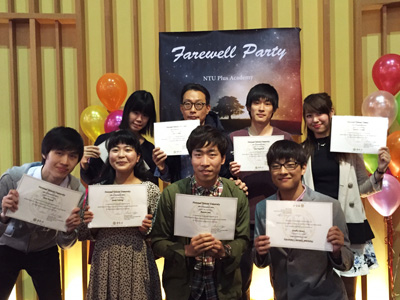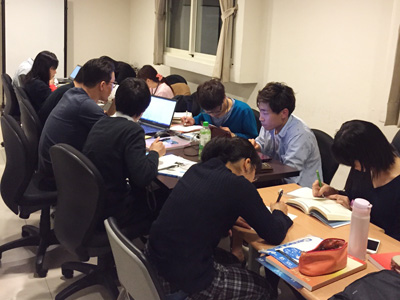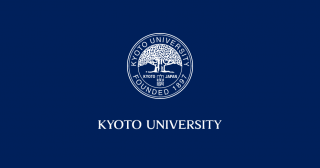Eight Kyoto University students participated in the 2016 Spring School hosted by National Taiwan University (NTU) as part of the Short-Term Study Abroad Program under the Agreement on Inter-University Students Exchange (also known as the East Asia Short-Term Study Abroad Program). The program included Chinese lessons particularly focusing on speaking and listening, lectures on the history and culture of Taiwan, special lectures delivered in English, and several field trips. Chinese lessons were provided on weekday mornings, in which students were only allowed to use Chinese.
NTU students took part in the program as advisers, supporting KU classmates in their Chinese language studies. These advisers also planned and ran the field trips, providing a source of inspiration for many of the KU students.
There is a strong expectation that participants will continue to deepen their friendships gained through the program.
Report form a participating student
Nanami Tsunoda
Deputy group leader for the National Taiwan University Spring School
Second-year, Faculty of Integrated Human Studies, Kyoto University
(Report presented at a debriefing held on Friday 25 March 2016)
I took part in the 2016 National Taiwan University Spring School along with seven other KU students, and exchanged with NTU students as well as with participating students from across Japan for three weeks, from 29 February through 20 March.
This Spring School, in particular aimed at mastering the Chinese language and deepening understanding of Taiwanese culture, provided us with programs focusing on these two aims. For Chinese lessons, we were divided into four groups based on the results of an exam we took on the first day. Each class was comprised of only five to seven students, and we were required to use Chinese only when talking or asking questions. As class sizes were so small, we felt quite closer to the teacher. Even when we were well aware of mistakes made while speaking, or when we knew other students could not understand what we said, we had to speak Chinese anyway. In such an environment, I became able to speak to an extent that I myself was surprised at my progress by the end of the program. We also enjoyed a valuable opportunity to make a presentation in Chinese at the final examination.
To study Taiwanese culture, we experienced it using both our brains and our bodies, by listening to lectures in the classroom as well as by doing fieldwork after class and making one-day trips on weekends. We participated in a tour of the city of Taipei, and visited the National Palace Museum, Shilin Night Market, Jioufen, and Yilan, in order to study the historical background and cultural significance of each place. In such activities, NTU students accompanied us as advisors. They took care of us throughout the program, from picking us up at the airport on the first day, through helping us check in to the flight on the final day. The program was much more productive and memorable for us thanks to their assistance. Taiwan is known as being very friendly to Japan, and I now realize that such good relations between countries stems from exchange among individuals just like ours.
This program has great potential to make a positive difference for the participants. I hope many KU students will participate in this program and gain valuable experiences, which will be a stepping-stone toward the world stage.

At the closing ceremony

Preparing for class





